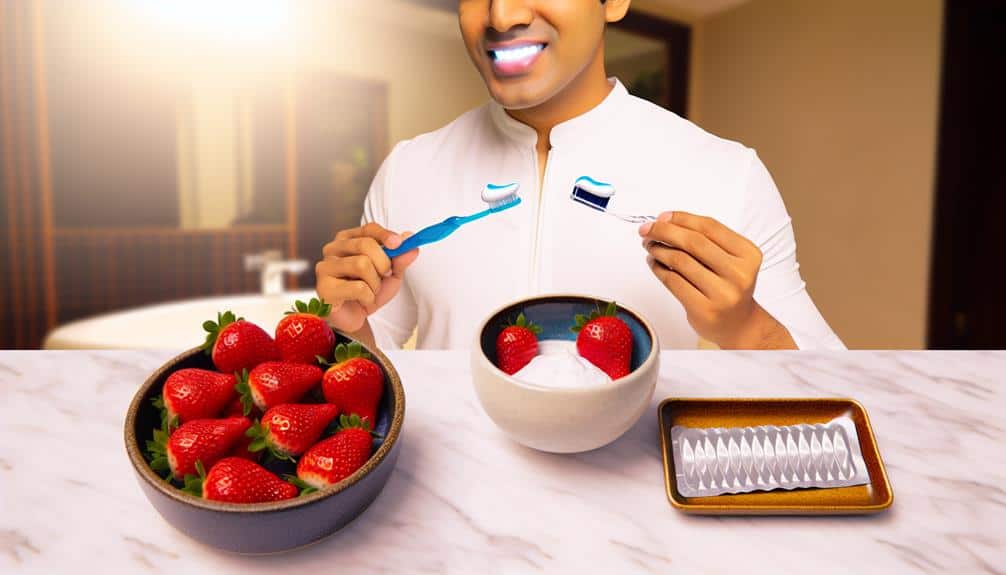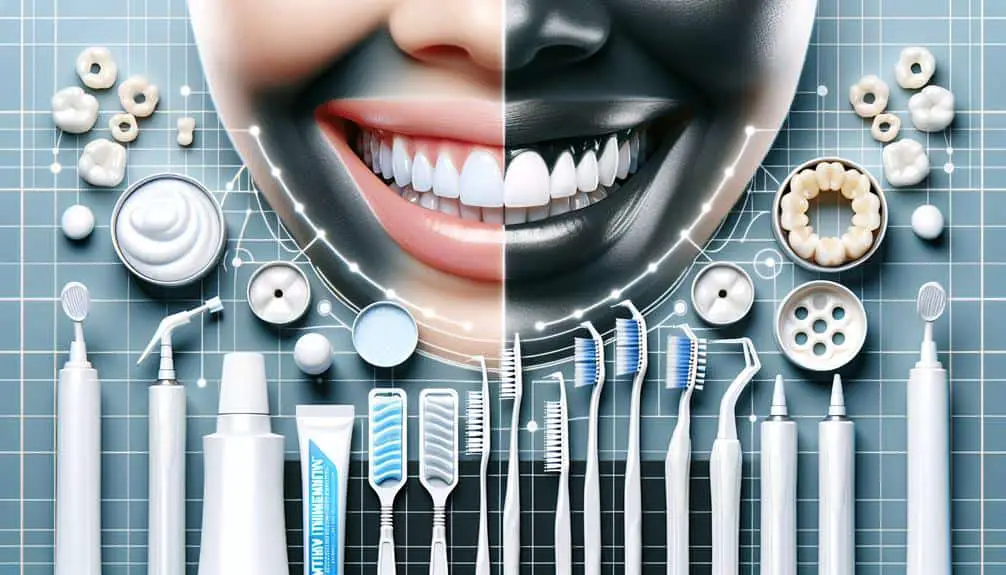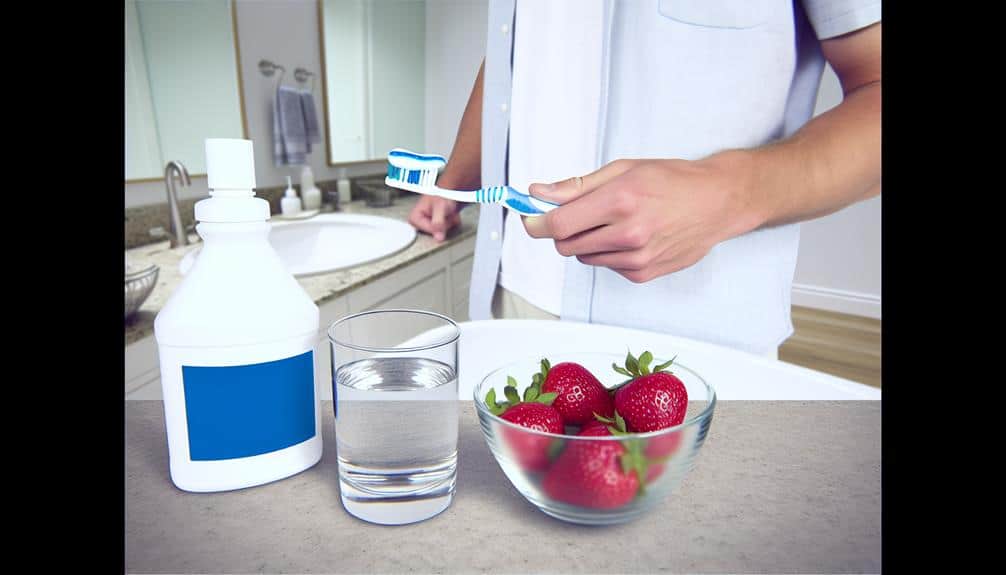To whiten your teeth effectively, consider professional whitening treatments utilizing high-concentration whitening agents like in-office bleaching or laser procedures. These options offer safe and rapid results for enhancing smile brightness. For a more natural approach, try oil pulling or using a baking soda paste to reduce dark spots. Making lifestyle changes such as proper oral hygiene, diet modifications, and using a straw when consuming stain-causing substances can also help prevent stains. Remember, maintaining a bright smile involves consistent habits and professional guidance for suitable options. Elevate your dental aesthetics with these tips for whiter teeth.
Key Points
- Professional whitening treatments offer safe and effective results with high-concentration whitening agents.
- Options include in-office bleaching and laser procedures for quick and noticeable whitening effects.
- Natural remedies like oil pulling and baking soda can help reduce dark spots on teeth.
- Maintain a bright smile by practicing proper oral hygiene, limiting staining foods, and using straws.
- Consistent daily habits like brushing, flossing, and staying hydrated are crucial for a whiter smile.
Causes of Dark Spots on Teeth
Dark spots on teeth can be caused by a variety of factors, including dietary choices and oral hygiene habits. Tooth discoloration, often attributed to the consumption of dark-colored beverages like coffee and tea, is a common issue affecting many individuals. The pigments in these drinks, known as tannins, can adhere to the enamel of your teeth, leading to stains over time.
To prevent such discoloration, it's advisable to moderate the intake of these beverages or use a straw to minimize contact with your teeth. Additionally, maintaining good oral hygiene practices such as regular brushing and flossing can help prevent the buildup of plaque and tartar, which can also contribute to dark spots on teeth.
Professional Whitening Treatments
Professional whitening treatments offer a safe and effective way to enhance the brightness of your smile by eliminating stains and discoloration from your teeth. These treatments are usually carried out by trained professionals in the field of cosmetic dentistry. Unlike at-home whitening kits, professional whitening treatments use higher concentrations of whitening agents, providing quicker and more noticeable results.
Cosmetic dentistry clinics offer a range of whitening options, including in-office bleaching and laser whitening procedures. During in-office bleaching, a protective gel is applied to your gums, and a bleaching agent is then applied to your teeth. A special light may be used to enhance the whitening process. Laser whitening, on the other hand, involves the use of a laser to activate the bleaching agent, accelerating the whitening effects.
Professional whitening treatments aren't only efficient but also supervised to guarantee safety and minimize sensitivity. If you desire rapid and reliable results, consulting a cosmetic dentistry professional for a professional whitening treatment may be the best option for achieving a whiter smile.
Natural Remedies for Dark Spots
When looking to address dark spots on your teeth, exploring natural remedies can be a holistic approach worth considering. Oil pulling, a traditional remedy that involves swishing oil around in your mouth, has been suggested to help with reducing dark spots. This technique is thought to lift stains and bacteria from the teeth, potentially aiding in lightening the appearance of dark spots.
Baking soda is another natural remedy that has gained popularity for its teeth-whitening properties. Its mild abrasive nature can help scrub away surface stains that contribute to dark spots on the teeth. You can create a paste by mixing baking soda with a small amount of water and brushing your teeth with it gently. However, consulting with a dental professional is important to make sure these methods are suitable for your specific oral health needs.
While natural remedies like oil pulling and baking soda may offer some benefits in reducing dark spots, consulting with a dental professional to make sure these methods are suitable for your specific oral health needs is important.
Lifestyle Changes to Prevent Stains
Implementing consistent oral hygiene practices and making mindful choices in your daily habits can play a significant role in preventing stains on your teeth. Proper oral hygiene, including brushing your teeth at least twice a day and flossing daily, helps remove plaque and prevent the buildup of stains from food and drinks.
Additionally, consider making diet modifications to prevent teeth staining. Limiting the consumption of staining foods and beverages such as coffee, tea, red wine, and dark berries can help maintain a brighter smile. When you do consume these items, consider using a straw to minimize contact with your teeth.
Rinsing your mouth with water after consuming stain-causing substances can also help reduce the risk of discoloration. By being mindful of your oral hygiene practices and making small changes to your diet, you can actively work towards preventing stains and maintaining a whiter smile.
Tips for Maintaining a Bright Smile
To maintain a bright smile, consistently practicing good oral hygiene habits and making smart dietary choices are key factors in preventing teeth stains. When it comes to maintaining a radiant smile, your daily habits play a significant role in the overall health and appearance of your teeth. Here are some essential tips to help you keep your smile looking its best:
- Brush and Floss Regularly: Proper brushing and flossing help remove plaque and prevent the buildup of stains on your teeth.
- Limit Staining Foods and Beverages: Avoid or moderate consumption of foods and drinks like coffee, tea, red wine, and berries that can stain your teeth.
- Stay Hydrated: Drinking plenty of water throughout the day not only keeps you hydrated but also helps rinse away food particles that can lead to stains.
Frequently Asked Questions
Can Whitening Toothpaste Really Make a Noticeable Difference in the Color of My Teeth?
Yes, whitening toothpaste can noticeably improve your teeth's color, but for more significant results, consider using whitening strips. Natural remedies like baking soda may also be effective. Consult a dentist for personalized advice.
Are There Any Specific Foods or Drinks That Can Help Prevent Dark Spots on Teeth?
Making dietary changes can help prevent dark spots on teeth. Natural remedies like crunchy fruits and vegetables, high in fiber, can act as natural cleaners. Avoiding foods with strong pigments, such as coffee and red wine, is key.
Is It Safe to Use At-Home Whitening Kits, and Do They Provide Long-Lasting Results?
Using at-home whitening kits can be safe, but long-lasting results vary. DIY methods like whitening toothpaste may help. Home remedies like baking soda should be used cautiously for effectiveness and safety. Consult a dentist for guidance.
How Often Should I Visit the Dentist for Professional Cleanings to Maintain a White Smile?
To maintain a white smile, your dentist suggests visiting every six months for professional cleanings. These dental check ups guarantee top-notch oral hygiene and catch issues early. Consistent care is crucial to preserving your bright smile.
Are There Any Potential Side Effects or Risks Associated With Teeth Whitening Treatments?
Long term effects of teeth whitening treatments can include heightened tooth sensitivity and potential harm to enamel if not done correctly. It's essential to seek professional advice before starting any whitening regimen to minimize risks.



